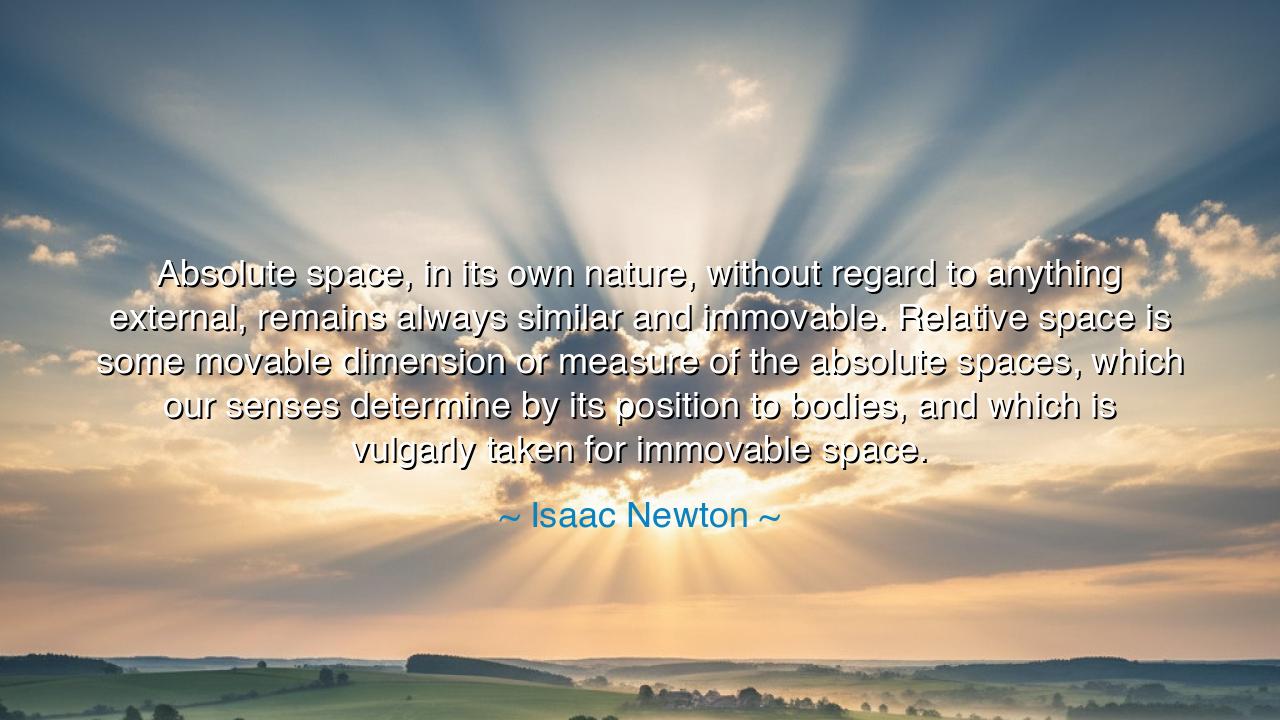
Absolute space, in its own nature, without regard to anything
Absolute space, in its own nature, without regard to anything external, remains always similar and immovable. Relative space is some movable dimension or measure of the absolute spaces, which our senses determine by its position to bodies, and which is vulgarly taken for immovable space.






Hear the voice of Sir Isaac Newton, master of motion and revealer of the heavens, who declared: “Absolute space, in its own nature, without regard to anything external, remains always similar and immovable. Relative space is some movable dimension or measure of the absolute spaces, which our senses determine by its position to bodies, and which is vulgarly taken for immovable space.” These words, born from his Principia Mathematica, are not only the pillars of physics but also a meditation on truth itself—on what is eternal and what is but an appearance.
The meaning is twofold. Absolute space is the invisible stage upon which all creation unfolds. It is changeless, unyielding, eternal, not dependent upon stars or planets, but existing whether they are present or not. Relative space, by contrast, is the shifting perception of distance and position, measured by the bodies around us—earth, sun, and stone. Men, bound by their senses, often mistake the relative for the absolute, believing that what appears steady is in fact immovable. But Newton, gazing deeper, knew that reality and appearance are not the same.
The origin of this teaching lies in Newton’s pursuit of celestial law. In his age, men debated whether motion itself was real or only a comparison between objects. Newton, through his great thought experiments—such as the rotating bucket of water, whose surface curves even when no external body is present—proved that motion must be measured against the unseen backdrop of absolute space. In this way, he unveiled a truth not visible to the senses, but made clear through reason and experiment.
Think on the explorers who navigated the seas. To the sailor, the stars seemed fixed, the heavens unchanging. Yet when the telescope was turned skyward, it revealed a greater truth: the earth itself moved, the stars themselves wandered, and what was thought immovable was but relative space. Here again, Newton’s words remind us: what we see is not always what is, and the eternal ground is often hidden beneath the veil of appearances.
This wisdom extends beyond physics into the life of the soul. Many take the fleeting—wealth, status, opinion—as though it were absolute, building their lives upon what is shifting. But the wise know that such things are but relative, their measure determined by circumstance and perception. The true absolute—principles of justice, love, truth, and integrity—remains unmoved, even when the world sways like a ship upon the sea. To confuse the relative with the absolute is to live in delusion; to know the difference is to stand firm in the storm.
The lesson for us, children of time, is clear. In our lives, we must discern what is absolute and what is relative. Do not mistake the opinions of men for eternal law, nor the shifting fortunes of the day for lasting truth. Seek out that which remains the same through all changes, and let that be your anchor. Just as Newton measured motion against the stillness of absolute space, so too must we measure our actions against the stillness of eternal values.
Practical action flows from this truth. When faced with decisions, ask: am I acting from the absolute, or am I swayed by the relative—by temporary pressure, by appearances, by the noise of the crowd? Root yourself in what endures, and you will not be easily moved. And when you see others lost in the shifting shadows, remember Newton’s teaching: that beyond what the senses show, there is a deeper frame, a stage upon which all unfolds.
Take this wisdom as a guiding flame: absolute space is eternal, relative space is fleeting. In the same way, eternal truth is unshaken, while appearances shift like sand. Live not by the shadows of the relative, but by the light of the absolute, and you will walk with steadiness, even as the stars themselves wheel and wander above you.






AAdministratorAdministrator
Welcome, honored guests. Please leave a comment, we will respond soon